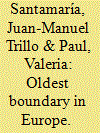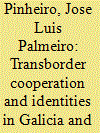|
|
|
Sort Order |
|
|
|
Items / Page
|
|
|
|
|
|
|
| Srl | Item |
| 1 |
ID:
129612


|
|
|
|
|
| Publication |
2014.
|
| Summary/Abstract |
The boundary between Spain and Portugal is supposed to be one of the most - if not the most - fixed and stable borders in the world, with some authors stating that it has a history of almost a thousand years. However, this paper demonstrates that this is not the case by arguing that it has a mobile nature. After formulating a theoretical framework on borders and border studies, this contribution focuses on the raia between Galicia and Portugal as a specific section of the international Spanish-Portuguese border; several questions elucidating the mobile nature of the raia are answered, embracing historic, geographic, social, cultural, linguistic and economic issues. The paper finishes by considering the effects of the new period of European integration and by providing some concluding remarks.
|
|
|
|
|
|
|
|
|
|
|
|
|
|
|
|
| 2 |
ID:
099504


|
|
|
|
|
| Publication |
2010.
|
| Summary/Abstract |
This article examines the cultural legacy of Galicia, a region comprising parts of Poland and Ukraine, once united under the Austro-Hungarian Empire. Using survey data compiled by the Comparative Study of Electoral Systems, we reconstruct the region of Galicia electoral district by electoral district, finding that Galicians today are far more civic than their compatriots. Sharing higher levels of political efficacy, Galicians are more likely to vote, and when they do, they are more likely to support parties who oppose the successor left. The vehicle for this cultural persistence, we argue, could be the (Greek) Catholic Church, which Galicians attend at far higher rates than the rest of Ukraine or Poland.
|
|
|
|
|
|
|
|
|
|
|
|
|
|
|
|
| 3 |
ID:
168668


|
|
|
|
|
| Summary/Abstract |
This paper aims to identify the factors leading to strong wind energy development in Galicia from 1995 to 2009, in the absence of social conflict. Using participatory research techniques, our work indicates that the absence of local opposition is associated to the regulatory framework throughout this period. The central elements contributing to a better understanding of the success of this wind energy development with no social conflict are vertical decision-making and wind energy planning; the lack of institutional information and participation mechanisms and, above all, the process that declared it as Public Utility, thus opening the possibility of land expropriation. Our work concludes that, in the case under study, communities had no relevant role; their participation in the wind energy development process was a mere formality emptied of decision-making capacity. The scope of community benefits therefore became irrelevant in explaining wind dynamics within that territory.
|
|
|
|
|
|
|
|
|
|
|
|
|
|
|
|
| 4 |
ID:
087526


|
|
|
|
|
| Publication |
2009.
|
| Summary/Abstract |
This article deals with the design and effects of state-centred strategies over a specific border area. Nationalist ideologies, culture, identity and persistence of historical facts are considered altogether in the case study of transborder relationships across a part of the Spanish-Portuguese boundary. Special attention is paid to political discourses and claims for recognition of transborder cultural feature and identity. As a matter of fact, the border's opening processes underwent in Europe and in other regional contexts around the world show clearly the permanence of nationalist and state-centred ways of understanding the world. Nationalism is reproduced by institutions and individuals through the consideration of cultural ties and differences across borders. Meanwhile, the globalising context in which we live makes necessary the assertion of multiple territorial and non-territorial identifications capable of overcoming the modern political framework based on states and boundaries.
|
|
|
|
|
|
|
|
|
|
|
|
|
|
|
|
| 5 |
ID:
185051


|
|
|
|
|
| Summary/Abstract |
MODERN Russian historians and journalists have been paying a great deal of attention to the Ukrainian national movement in the former Soviet Union. A lot of research has been done of the emergence of Ukrainian statehood; generous territorial transfers to the Ukrainian Soviet Socialist Republic from the Russian Soviet Federative Socialist Republic (RSFSR) and East European countries; the Ukrainification of former Malorossiya [Little Russia]; and the activities of Ukrainian radical nationalists before, during, and after World War II. Various aspects of the revival of nationalism in Ukraine in the 1990s are also on historians' radar.
|
|
|
|
|
|
|
|
|
|
|
|
|
|
|
|
|
|
|
|
|